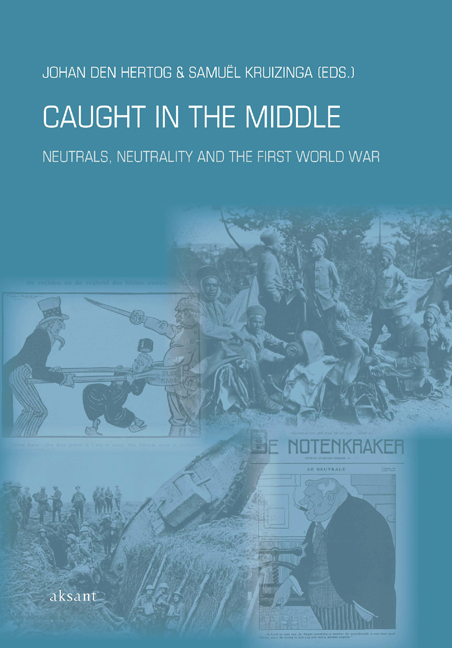Book contents
- Frontmatter
- Contents
- Acknowledgements
- Chapter 1 Introduction
- Chapter 2 Dutch Neutrality and the Value of Legal Argumentation
- Chapter 3 ‘Upon the Neutral Rests the Trusteeship of International Law’: Legal advisers and American unneutrality
- Chapter 4 Spanish Neutrality During the First World War
- Chapter 5 Britain’s Global War and Argentine Neutrality
- Chapter 6 NOT Neutrality: The Dutch government, the Netherlands Oversea Trust Company, and the Entente blockade of Germany, 1914-1918
- Chapter 7 From Parasite to Angel: Narratives of neutrality in the Swedish popular press during the First World War
- Chapter 8 Colour-blind or Clear-sighted Neutrality?: Georg Brandes and the First World War
- Chapter 9 The Hottest Places in Hell?: Finnish and Nordic neutrality from the perspective of French foreign policy, 1900-1940
- Chapter 10 The Other End of Neutrality: The First World War, the League of Nations, and Danish neutrality
- About the Contributors
Chapter 7 - From Parasite to Angel: Narratives of neutrality in the Swedish popular press during the First World War
Published online by Cambridge University Press: 28 January 2021
- Frontmatter
- Contents
- Acknowledgements
- Chapter 1 Introduction
- Chapter 2 Dutch Neutrality and the Value of Legal Argumentation
- Chapter 3 ‘Upon the Neutral Rests the Trusteeship of International Law’: Legal advisers and American unneutrality
- Chapter 4 Spanish Neutrality During the First World War
- Chapter 5 Britain’s Global War and Argentine Neutrality
- Chapter 6 NOT Neutrality: The Dutch government, the Netherlands Oversea Trust Company, and the Entente blockade of Germany, 1914-1918
- Chapter 7 From Parasite to Angel: Narratives of neutrality in the Swedish popular press during the First World War
- Chapter 8 Colour-blind or Clear-sighted Neutrality?: Georg Brandes and the First World War
- Chapter 9 The Hottest Places in Hell?: Finnish and Nordic neutrality from the perspective of French foreign policy, 1900-1940
- Chapter 10 The Other End of Neutrality: The First World War, the League of Nations, and Danish neutrality
- About the Contributors
Summary
‘For who can be neutral in his heart, except the very ignorant or the very indolent? We are far too involved for that.’
In the highly emotional and politically polarized climate of the First World War, where the war was seen as an absolute, righteous fight between Good and Evil, neutrality became increasingly inconceivable and suspicious. The very possibility of staying neutral was in fact questioned. Both belligerent parties accused the neutrals of secretly collaborating with the enemy, and neutral actors like the Red Cross and the Vatican were said to have hidden, partial agendas. In cultural terms, neutrality was also dubious, connoting lack of character, cultural castration and national sterility. It was deemed unmanly, a sign of national weakness and decay, a position taken up by cranks, cowards and traitors. In Italy, for example, the debate about war participation in 1914 and 1915 was fuelled by gender anxieties and fears of the nation's increasingly ‘feminized’ image. Warring seemed necessary to prove Italy's manliness.
Furthermore, the position of the neutrals deteriorated over time. The war saw a metamorphosis in attitudes towards neutrality in the international public sphere: if at the beginning seen as the moral arbiters to be won over, by the end of it most belligerents regarded neutrality as anachronistic, sanctimonious and immoral and the neutrals were subsequently degraded from ‘neutral judges’ to ‘selfish non-combatants.’ As sacrifice increasingly came to determine the meaning of war, and since the neutrals were said not to have sacrificed, they were denied any opinion regarding the moral values in the war, let alone the peace conditions.
The aim of this article is to investigate the shifting narratives and images of neutrality in Sweden during the First World War, primarily focusing on its identity dimensions. Historian Mikael af Malmborg criticizes earlier research on the topic for being either too occupied with neutrality as a mere legal or political doctrine, or concentrating too much on the military aspects. Rather, af Malmborg considers neutrality as a form of pursuing sovereignty, and a cornerstone of Swedish national identity. Representing a certain idea of Sweden, intimately related to modernity, democracy and welfare, many Swedes developed a kind of ‘emotional tie’ with neutrality. It was not only associated with abstention from war, but also with safeguarding the Swedish model in the future.
- Type
- Chapter
- Information
- Caught in the MiddleNeutrals, Neutrality and the First World War, pp. 105 - 120Publisher: Amsterdam University PressPrint publication year: 2012



